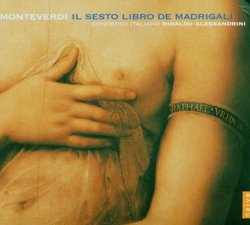| All Artists: Monteverdi, Concerto Italiano, Alessandrini Title: Monteverdi: Il Sesto Libro de Madrigali Members Wishing: 0 Total Copies: 0 Label: Opus 111 Original Release Date: 1/1/2006 Re-Release Date: 5/16/2006 Genre: Classical Styles: Opera & Classical Vocal, Chamber Music, Historical Periods, Baroque (c.1600-1750), Classical (c.1770-1830) Number of Discs: 1 SwapaCD Credits: 1 UPC: 709861304233 |
Search - Monteverdi, Concerto Italiano, Alessandrini :: Monteverdi: Il Sesto Libro de Madrigali
 | Monteverdi, Concerto Italiano, Alessandrini Monteverdi: Il Sesto Libro de Madrigali Genre: Classical
|
Larger Image |
CD Details |
CD ReviewsDespair is NOT a Modern Secular Invention! Giordano Bruno | Wherever I am, I am. | 09/16/2008 (5 out of 5 stars) "Claudio Monteverdi (1567-1643) was, judging by his music, a devote believer in the glory of the Christian religion and the Christian mysteries. More than any other composer, he expressed the ideals of his era, the Counter-reformation, in his paeans of spiritual joy in the Marian Vespers and in his masses and motets. People feel that religious exaltation in his music; the Vespers of 1610 ranks only behind Handel's Messiah and Bach's B-minor mass in frequency of performance worldwide.
Monteverdi's Sixth Book of madrigals, nevertheless, is an expression of unconsolable despair - ten settings of poetic laments over parting and death, with only the most wistful reference in one of them to another life. The evidence suggests that this was Monteverdi's most personal collection, representing his profound grief at the death of his wife in 1607 and of his favorite pupil in 1608, a young soprano for whom he had written the opera Arianna, plus his distress at the collapse of his career in Mantua. It's a tribute to Monteverdi's humanity - his HUMANISM - that he could share his grief with the world in possibly the most gorgeous songs of sorrow ever written, realizing the human value of sorrow without sentimentalizing or passing judgment on it. So... These are the saddest and most beautiful of Monteverdi's madrigals. The version of Il Lamento d'Arianna in the Sixth Book is a five-voice recomposition of the aria from the lost opera. The aria also survives as a tantalizing fragment, a favorite of sopranos, but the polyphonic madrigal is incomparable. Monteverdi had set Petrarch's poem Zefiro Torna as a canzonetta of exquisite light-heartedness, but in the Sixth Book he transforms it into a poignant lament. Here's the poem in translation: "Zephyr returns and brings back the sweet season / and grasses and flowers, his sweet companions,/ and twittering swallows and nightingales, / and Spring, white and rosy. The meadows smile, the sky is blue once more; / Jove gazes upon his daughter with delight; / Earth, air, and water are filled with love./ Every creature renews its courtship. But for me, alas, the heaviest sighs return, / rising from the depths of my heart, / drawn by the one who took its key with her to heaven. And birdsong and the meadow flowers, / and the sweet actions of fair and honest women / are as a wilderness and cruel wild beasts." Throughout the other madrigals, one can hear, in the achingly beautiful cadences and sighs, the heartfelt despair that Monteverdi found integral to the human condition... the awareness of the death of one's loves, which no religious certainty has ever assuaged. Rinaldo Alessandrini and his Concerto Italiano get it right as usual. If ever you hear a more perfect ensemble than this - in tuning, in articulation and attacks, in unity of interpretation, in vocal blend and balance - ring the fire bell, send me an e-mail, rouse me from the grave if necessary, because I won't believe it until I hear it myself. This is a knock-out glorious performance!" |

 Track Listings (18) - Disc #1
Track Listings (18) - Disc #1